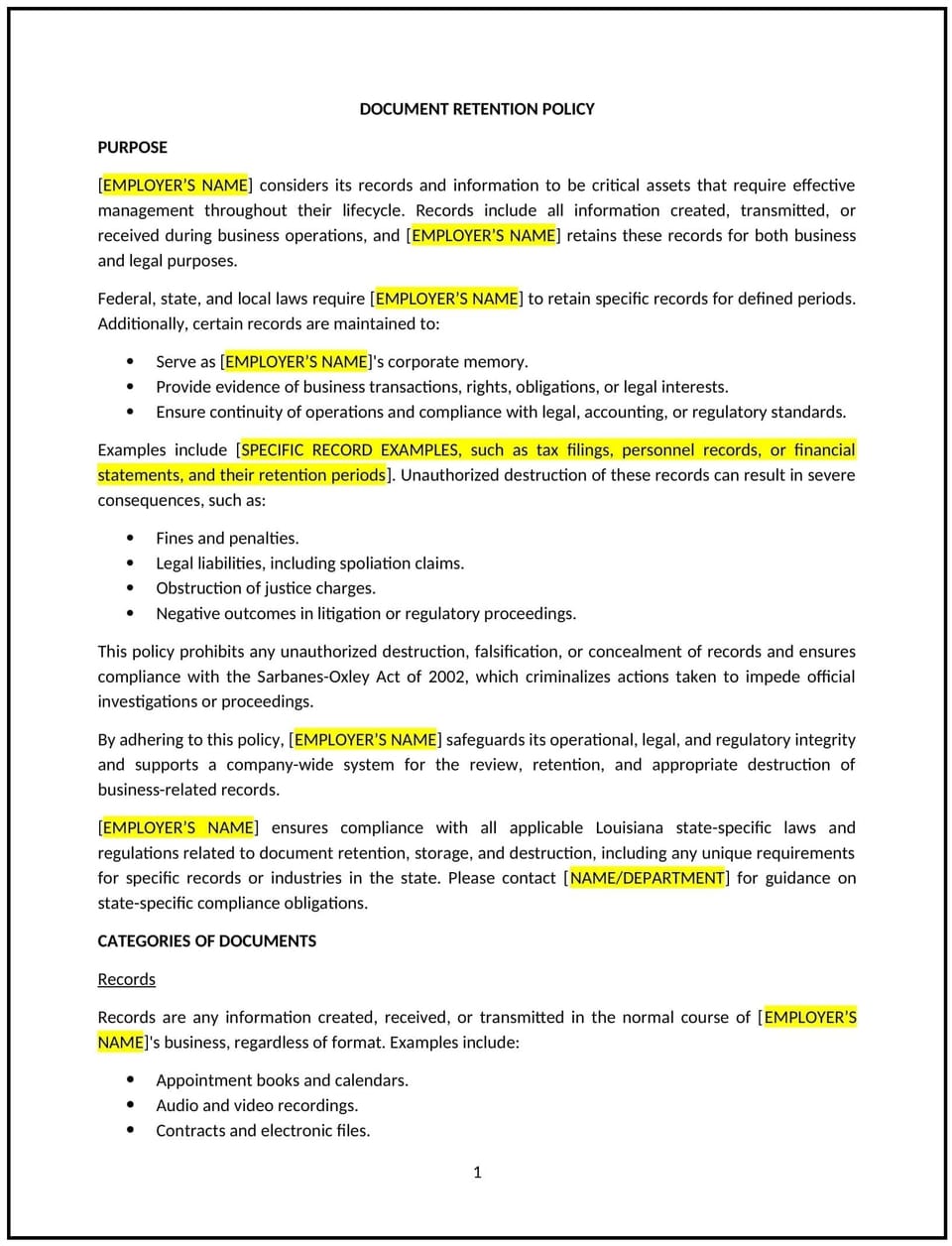Document retention policy (Louisiana): Free template

Document retention policy (Louisiana)
This document retention policy is designed to help Louisiana businesses manage the retention, storage, and disposal of company records effectively. It outlines the types of documents to retain, the duration of retention, and procedures for secure disposal to support operational efficiency and minimize risks.
By implementing this policy, businesses can streamline document management, protect sensitive information, and reduce unnecessary storage costs.
How to use this document retention policy (Louisiana)
- Define document categories: Specify the types of records covered by the policy, such as financial documents, employee records, contracts, and tax filings.
- Establish retention periods: Outline how long each category of documents should be retained, based on business needs and legal requirements.
- Detail storage methods: Provide guidelines for securely storing physical and digital documents, ensuring accessibility and data protection.
- Include disposal procedures: Define how documents should be securely disposed of when retention periods expire, such as shredding or data wiping.
- Assign responsibilities: Identify individuals or teams responsible for managing document retention and ensuring adherence to the policy.
- Schedule regular audits: Specify how and when document inventories will be reviewed to ensure proper retention and disposal.
Benefits of using a document retention policy (Louisiana)
Implementing this policy provides several advantages for Louisiana businesses:
- Streamlines document management: Reduces clutter and improves accessibility by organizing records effectively.
- Mitigates risks: Protects sensitive information and minimizes the potential for data breaches or legal issues.
- Saves costs: Reduces storage expenses by disposing of outdated or unnecessary records.
- Promotes accountability: Clarifies responsibilities for document management across the organization.
- Reflects Louisiana-specific considerations: Incorporates local regulations and best practices for managing records.
Tips for using this document retention policy (Louisiana)
- Create a retention schedule: Develop a detailed schedule specifying retention periods for all document types.
- Train employees: Educate staff on proper document handling, storage, and disposal procedures.
- Use secure storage solutions: Implement physical and digital storage systems with robust security measures.
- Monitor retention compliance: Conduct regular audits to ensure documents are retained and disposed of according to the policy.
- Update the policy regularly: Adapt retention periods and procedures to reflect changes in business needs or Louisiana regulations.
Q: What types of documents are covered by this policy?
A: This policy covers various document categories, including financial records, contracts, employee files, tax documents, and operational reports.
Q: How should businesses determine retention periods?
A: Retention periods should be based on business needs, industry standards, and applicable Louisiana or federal regulations.
Q: What methods should be used for securely disposing of documents?
A: Secure disposal methods include shredding physical documents, data wiping digital files, or using certified destruction services.
Q: Who is responsible for managing document retention?
A: Designated individuals, such as department heads or IT staff, are typically responsible for overseeing document retention and disposal.
Q: How can businesses protect sensitive information during storage?
A: Businesses should use secure storage solutions, such as locked cabinets for physical files or encrypted systems for digital records.
Q: How often should this policy be reviewed?
A: The policy should be reviewed annually or whenever changes in business practices or Louisiana regulations affect document retention needs.
Q: What tools can businesses use to manage document retention?
A: Businesses can use document management systems (DMS) or cloud-based solutions to organize, store, and track records effectively.
This article contains general legal information and does not contain legal advice. Cobrief is not a law firm or a substitute for an attorney or law firm. The law is complex and changes often. For legal advice, please ask a lawyer.


